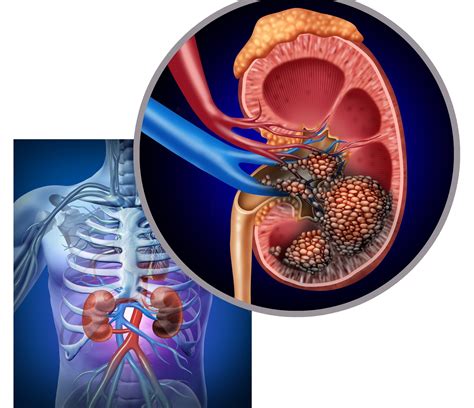Kidney Cancer Information
Kidney Cancer FAQ
What is kidney cancer?
Kidney cancer, also called renal cancer, is a type of cancer that starts in the kidneys. The kidneys are 2 small organs either side of your spine below your ribs. They remove waste and extra fluid from the blood, turning it into pee. Kidney cancer is most common in people over 60.
How does kidney cancer start?
Doctors know that kidney cancer begins when some kidney cells develop changes (mutations) in their DNA. A cell's DNA contains the instructions that tell a cell what to do. The changes tell the cells to grow and divide rapidly. The accumulating abnormal cells form a tumor that can extend beyond the kidney.
What causes kidney cancer?
The exact cause of kidney cancer is unknown, but some things can increase your chances of getting it, including: obesity – a body mass index (BMI) of 30 or more (use the healthy weight calculator to find your BMI) family history – you're more likely to get kidney cancer if you have a close relative with it
Why do kidney cells change and become cancerous?
The reason why kidney cells change and become cancerous is not yet known. We know that people are more likely to develop kidney cancer as they age. However, there are certain risk factors linked to the kidney cancer. Useful animated videos, information on treatments, and other helpful resources on kidney cancer.
What is the most common type of kidney cancer?
The most common type is clear cell renal cancer. Kidney cancers do not always cause symptoms. Blood in the urine is the most common symptom. We have more information about the signs and symptoms of kidney cancer. The causes of kidney cancer are unknown.
How do I know if I have kidney cancer?
a lump or swelling in your side (although kidney cancer is often too small to feel) See a GP if you have symptoms of kidney cancer. Although it's unlikely you have cancer, it's important to get your symptoms checked out. The GP will ask about your symptoms and may test a sample of your urine to see if it contains blood or an infection.
Kidney Cancer References
If you want to know more about Kidney Cancer, consider exploring links below:
What Is Kidney Cancer
- https://www.nhs.uk/conditions/kidney-cancer/
- https://www.cancerresearchuk.org/about-cancer/kidney-cancer/about
- https://www.kidney.org/atoz/content/kidney-cancer
- https://www.mayoclinic.org/diseases-conditions/kidney-cancer/symptoms-causes/syc-20352664
- https://www.macmillan.org.uk/cancer-information-and-support/kidney-cancer
- https://www.cancer.org/cancer/types/kidney-cancer/about/what-is-kidney-cancer.html
Explore Related Topics
Enhancing Diabetic Retinopathy Treatment with Nanotechnology: A Brighter Future?
Can nanotechnology innovations revolutionize the treatment of diabetic retinopathy?
